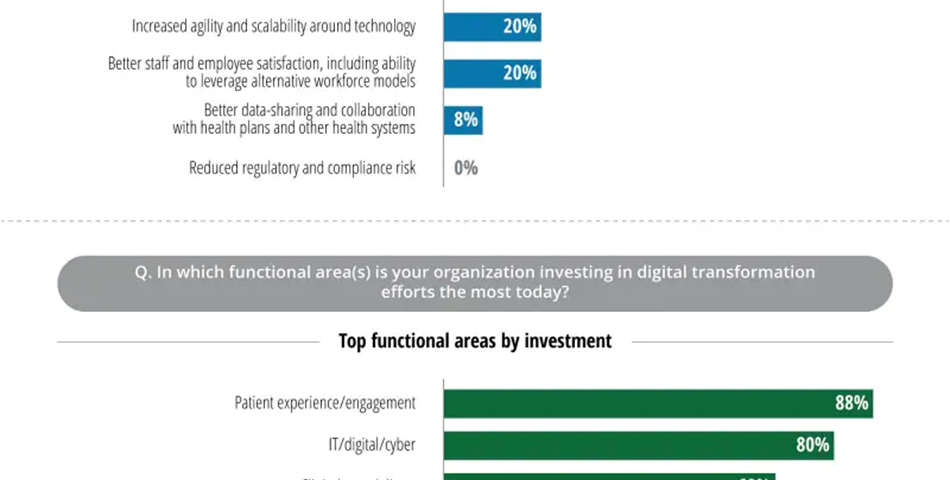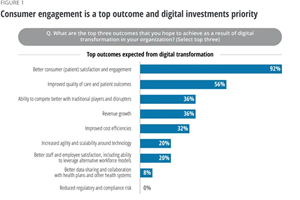Executive summary
The COVID-19 pandemic accelerated the convergence of several trends in the health care industry, particularly consumers prioritizing convenience and access to care. Leading health systems view digital transformation as a way to become more consumer-friendly while simultaneously changing their operations, culture, and use of technology.
The Deloitte Center for Health Solutions collaborated with the Scottsdale Institute to better understand how health systems are using digital to transform health care. To understand the digital transformation journey of health systems, we engaged Scottsdale Institute members in multipronged research: We conducted a survey of technology executives of 25 health systems, interviewed five health system technology leaders, and facilitated a moderated panel discussion of technology leaders from three health systems. We found that:
Health systems consider digital capabilities a path to fundamentally transform their relationship with consumers.
Most survey respondents are hoping to achieve better patient experience (92%) as the top desired outcome from digital transformation. Health system interviewees and panelists discussed taking a consumer-centered, outside-in approach—designing processes and experiences from a consumer’s perspective as a way to build their trust and loyalty—to improve patient experience and build on newer forms of care delivery using digital technology.
While the digital transformation journey is long, health systems are focusing on interim milestones to show value.
When asked how far they are from an ideal digital state, most survey respondents (60%) rated their organizations as midway through their journeys. Health system interviewees and panelists acknowledged that the transformation journey is longer than they had initially expected as the opportunities and definition of digital transformation expand. They also discussed a need to create frequent checkpoints to measure the value of the initiatives, rather than waiting until the completion of the initiatives to measure returns on investments (ROIs).
Talent, data, and setting key performance indicators (KPIs) are challenges to overcome, in addition to budget.
Survey respondents, interviewees, and panelists alike discussed how the quality and quantity of talent to support digital transformation initiatives was one of the biggest barriers to overcome. And one-third of respondents said talent is their top investment priority in the next 3 years. To address challenges with data, survey respondents and interviewees reported investments in data interoperability and creation of the right KPIs as top priorities in the next 3 years. Despite budget being a top reported constraint, two in three respondents expect investments in digital transformation initiatives as a percentage of total information technology (IT) budget to increase in the next 3 years.
Over the past two decades, many hospitals and health systems adopted digital technologies in their various functional areas. In many cases, however, they took a piecemeal approach to numerous initiatives—from installing electronic health record (EHR) systems to building apps to trying disruptive technologies such as artificial intelligence (AI)—while remaining largely focused on the same business and customer models.
Virtual health and care delivered in the home became the model of not only necessity but also preference. But this change was not as sudden as it might look. The pandemic was an accelerator of several trends, including shifting consumer preferences, rapidly evolving technologies, newer talent models, and clinical innovation.
Conclusion
Health systems recognize that digital transformation is essential to improving health care and strengthening customer relationships. It is more than just investments in technology—it results in changes in organizational culture and employee engagement; it is an enterprise investment that requires enterprise-wide participation.
The impact of digital transformation will be felt across all aspects of health care, helping enable easier access to care, improving quality, and decreasing the cost of care. Consumers can connect quickly and conveniently with their preferred provider. In addition to stronger consumer relationships, digital transformation can also help improve operational and financial efficiencies and bring health systems’ long-term strategies into reality.
By Chris Shudes, Maulesh Shukla, Christine Chang, Chuck Appleby, John Hendricks, Janice Wurz











